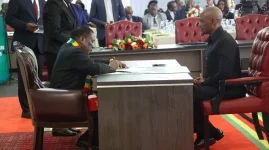The government brought in outside experts to check how top officials did their jobs. This includes Cabinet ministers and makes sure everyone receives fair treatment during reviews. Back in 2021, officials started using performance contracts for ministers, permanent secretaries, local leaders, and public company executives. They wanted more accountability and better results from everyone working for the public.
These contracts help push toward Vision 2030 goals of creating a modern, wealthy, industrial country. Officials face reviews every three months, twice yearly, and once a year. The government picked an independent company to help make these reviews honest and focused on actual results. After each budget year ends, they create one big report on everyone's work.
This report goes straight to President Mnangagwa and the entire Cabinet. It shows which agencies did well and ranks all senior officials from best to worst. Last week, the government recognized star performers during a special event at State House in Harare. Felix Mhona from Transport and Infrastructure came out on top of all the ministers.
Dr. Anxious Masuka from Agriculture took second place, and July Moyo from Public Service earned third place. All three received trophies at the State House ceremony. Senator Monica Mutsvangwa from Women Affairs came in fourth, and Professor Amon Murwira from Foreign Affairs ranked fifth, though they did not receive trophies at the event.
The government also praised five other ministries for their great work in specific areas. The Tourism Ministry helped grow its sector fast, reaching 15 percent of the country's total economic output. They ran the first Regional African Gastronomy Forum after winning the right to host it last February. The ministry also organized cooking competitions across provinces and nationally.
Tourism officials represented Zimbabwe at major international events like the World Travel Market, ITB Berlin, Meetings Africa, and Sanganai/Hlanganani. The Justice Ministry launched a program for title deeds and fixing irregular settlements. They also spread court services to more areas, making justice more accessible for regular people throughout the country.
Justice officials updated business registration laws and moved company, deed, and intellectual property systems to digital platforms. The Education Ministry achieved the highest O-Level passing rate since 1984. They added strong security measures that prevented test papers from leaking. Education leaders partnered with businesses, communities, churches, and civic groups to build new schools.
The Mining Ministry kept Zimbabwe's mineral sector growing despite worldwide challenges. They increased mineral exports to $5.34 billion, beating their $4 billion target. The mining sector grew by 2.3 percent even when global prices dropped, avoiding mine closures that affected other countries. They attracted new investments like the Palm River Mining Project.
The Home Affairs Ministry modernized the Civil Registry Office and brought services closer to citizens by expanding to district levels. This made documents easier for everyone to access. They also started creating a smart traffic management system as part of the government's electronic services plan.
These contracts help push toward Vision 2030 goals of creating a modern, wealthy, industrial country. Officials face reviews every three months, twice yearly, and once a year. The government picked an independent company to help make these reviews honest and focused on actual results. After each budget year ends, they create one big report on everyone's work.
This report goes straight to President Mnangagwa and the entire Cabinet. It shows which agencies did well and ranks all senior officials from best to worst. Last week, the government recognized star performers during a special event at State House in Harare. Felix Mhona from Transport and Infrastructure came out on top of all the ministers.
Dr. Anxious Masuka from Agriculture took second place, and July Moyo from Public Service earned third place. All three received trophies at the State House ceremony. Senator Monica Mutsvangwa from Women Affairs came in fourth, and Professor Amon Murwira from Foreign Affairs ranked fifth, though they did not receive trophies at the event.
The government also praised five other ministries for their great work in specific areas. The Tourism Ministry helped grow its sector fast, reaching 15 percent of the country's total economic output. They ran the first Regional African Gastronomy Forum after winning the right to host it last February. The ministry also organized cooking competitions across provinces and nationally.
Tourism officials represented Zimbabwe at major international events like the World Travel Market, ITB Berlin, Meetings Africa, and Sanganai/Hlanganani. The Justice Ministry launched a program for title deeds and fixing irregular settlements. They also spread court services to more areas, making justice more accessible for regular people throughout the country.
Justice officials updated business registration laws and moved company, deed, and intellectual property systems to digital platforms. The Education Ministry achieved the highest O-Level passing rate since 1984. They added strong security measures that prevented test papers from leaking. Education leaders partnered with businesses, communities, churches, and civic groups to build new schools.
The Mining Ministry kept Zimbabwe's mineral sector growing despite worldwide challenges. They increased mineral exports to $5.34 billion, beating their $4 billion target. The mining sector grew by 2.3 percent even when global prices dropped, avoiding mine closures that affected other countries. They attracted new investments like the Palm River Mining Project.
The Home Affairs Ministry modernized the Civil Registry Office and brought services closer to citizens by expanding to district levels. This made documents easier for everyone to access. They also started creating a smart traffic management system as part of the government's electronic services plan.












